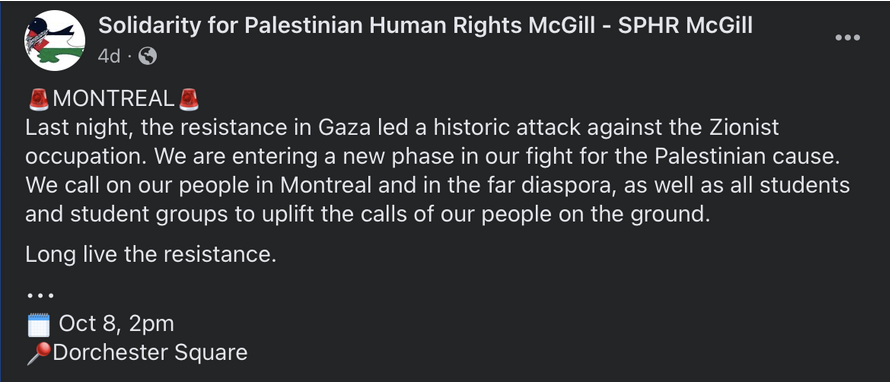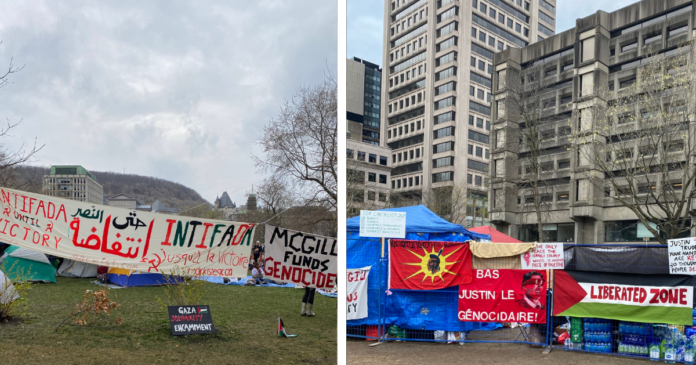A pro-Palestinian student organizer affiliated with an anti-Israel encampment occupying McGill University’s campus is refusing to condemn Hamas and its Oct. 7 attack on Israel or call for the return of hostages still held captive after nearly seven months.
The spokesperson for Solidarity for Palestinian Human Rights McGill, who would not provide her name, instead opted to condemn Israel, Canada and the United States, and claimed that the Jewish state does not care about the hostages held in captivity by Hamas.
Solidarity for Palestinian Human Rights is one of several groups involved in the encampment.
“We condemn the Israeli regime for sustaining a 75-year-old violent occupation and besieging an entire strip and caging 2.2 million people in essentially atrocious conditions,” said the spokesperson in response to a question about Hamas.
“We condemn the United States and the Canadian government for complicity in this occupation and this genocide,” she added. The spokesperson also condemned McGill and Concordia administrators.
The spokesperson said that her organization supports “the Palestinian people’s right to resist this occupation.”
When asked if that right to “resist occupation” included resistance through Hamas, as some have stated in the past, she said Palestinians “have the right to resist the occupation by means that they deem necessary.”
Hamas is designated as a terrorist organization by the Canadian government, as well as the U.S. government and the European Union.
On Oct. 7, Hamas terrorists killed over 1,200 Israelis in the biggest attack on Jews since the Holocaust. Among other things, terrorists slaughtered babies, raped women, burned families and also took hundreds of innocent civilians hostage.
The Solidarity for Palestinian Human Rights spokesperson, however, would not condemn Hamas’ actions on Oct 7, instead referring True North to social media statements issued by the group in October on the matter.
The day after Oct. 7, the group had come under fire for publishing a Facebook post that praised Hamas’s action as “heroic” and “monumental.” The group also cheered on the launching of rockets and the taking of hostages and encouraged Montrealers to “celebrate the resistance’s success.”

The spokesperson also attempted to contextualize attacks against Israel, noting “we reject taking this out of context, which is the context of a 75-year-old occupation.”
She also refused to call for a return of the hostages, accusing Israel of not caring about the safety of those hostages and claiming it was not in the country’s best interest for the hostages to be returned.
“We have also seen that the Israeli regime is not interested in the safety of their hostages. We have seen some of these hostages being specifically targeted by the Israeli forces on the ground and through air strikes,” the spokesperson claimed. “It’s not even in the interest of the Israeli regime to have these hostages returned.”
Three Israeli hostages were accidentally killed by Israeli forces in December, amidst IDF soldiers thinking they were being ambushed by Hamas. The Israeli government apologized to the families of those hostages.
“There is a direct link between the sad and very unfortunate mistake in killing those Israeli former hostages and the other ambush incidents,” IDF spokesperson Lt. Col. Jonathan Conricus told NBC news at the time.
The anti-Israel encampment at McGill was set up on Saturday but has since tripled in size. Protesters say they will remain there indefinitely, despite being asked to leave.
It is inspired by similar encampments seen at U.S. universities, such as Columbia University and New York University.
“Our universities have become instruments of violence and instruments that are essentially supporting occupation and genocide,” said the Solidarity for Palestinian Human Rights spokesperson.
In a document, students say McGill has investments with 50 companies that have “links to the ongoing Palestinian genocide.”
The spokesperson added that students are ”reclaiming their campus” with this encampment, and “transforming their campus into a popular university… that is open for the community, where it is a site of solidarity and a site of collective knowledge.”
However, in addition to signs calling for a divestment of funds and for a free Palestine, signs calling for Intifada (armed uprising) and praising Aaron Bushell, a U.S. airman who set himself on fire for Gaza, were seen at the encampment. People wearing mock suicide vests and people affiliated with far-left communist groups were also in attendance.
The spokesperson however asserted that the space is inclusive of different members of the community. “This is open to the community as a whole,” she said.
She was however hesitant to say whether Zionist Jews were welcomed into the space to share their experience. “It is a space for the community and people of conscience in Montreal to congregate,” she said.
The McGill administration has shared concerns with the encampment and actions of pro-Palestinian protesters. It also noted that it believes many of the occupiers are not McGill students.
“The situation on the ground has shifted significantly. The number of individuals who have set up tents on campus has tripled,” said McGill in a statement to True North. “Additionally, we have become aware that many of them, if not the majority, are not members of the McGill community.”
The university also said it had seen evidence of “unequivocally antisemitic language and intimidating behaviour” that has taken place at the encampment, and that they “condemn this in the strongest possible terms and will act quickly to investigate.”
McGill also said they are currently communicating with lawyers retained by students in the encampment, but claims these students are refusing to collaborate.
Similar anti-Israel protests have since popped up at the University of British Columbia and the University of Ottawa.















